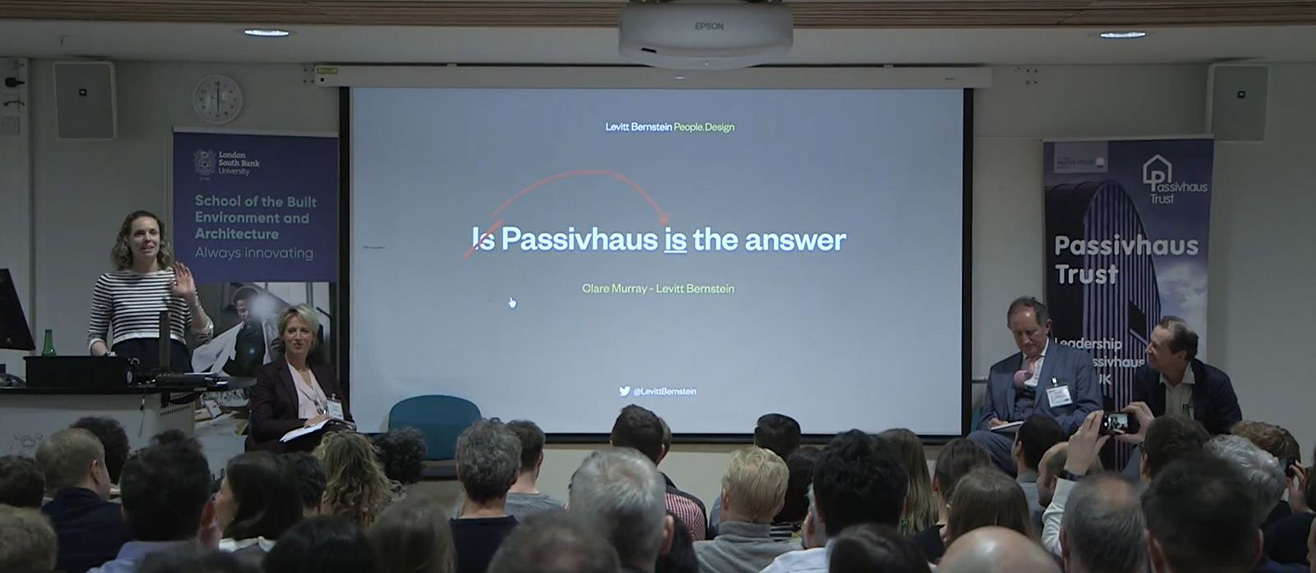
Climate Emergency debate series launches with motion, ‘Is Passivhaus the answer’?
An exciting series of climate emergency panel debates, led by LSBU’s School of Architecture and the Built Environment (BEA), designed to address climate change challenges faced by the construction and housing sectors, launched on Thursday 30 January, with the panel of industry experts addressing the motion, ‘Is Passivhaus the Answer?’An exciting series of climate emergency panel debates, led by LSBU’s School of Architecture and the Built Environment (BEA), designed to address climate change challenges faced by the construction and housing sectors, launched on Thursday 30 January, with the panel of industry experts addressing the motion, ‘Is Passivhaus the Answer?’
By taking the lead in organising and hosting the climate emergency debate series, BEA is demonstrating the University’s commitment to combatting the global environmental crisis.
Each panel discussion in the series will follow a different climate change-related theme. The first event addressed the issue of reducing emissions from social housing and new builds in the housing sector. It was hosted by BEA at LSBU, in partnership with non-profit, built environment leadership body, Passivhaus Trust and the London Energy Transformation Initiative (LETI),
Kicking off the first debate, panellists were charged with debating whether the popular, energy efficient, international building standard, ‘Passivhaus’, could be the answer to combatting the UK’s challenge of meeting Carbon zero targets by reducing emissions from new builds, including housing stock.
Clare Murray, Head of Sustainability at Levitt Bernstein Architects, speaking in favour of adopting the Passivhaus model, focused on the need to meet our UK zero carbon commitments in order to better support job creation in a rapidly growing green economy.
Emma Osmundsen, Housing Development Manager at Exeter City Council, also speaking in favour of Passivhaus, spelt out the health and human habitation positives of adopting the popular international building standard. Emma supported the idea of a ‘development premium’ for councils that adopt the Passivhaus model – in the process demolishing misconceptions that expense is what prevents local authorities from engaging in large scale adoption of this particular housing model.
Speaking against - Rob Pannell, from The Buildings Hub and National House Buildings Council (NHBC), suggested the UK Construction industry needs to finesse its quality assurance procedures first, in order to meet the very high standards required by the Passivhaus Trust certification process.
Chris Twinn, from environmental planning advice agency, Twinn Sustainability Innovation, offered an alternative approach to the Passivhaus model, through which developers could achieve similar carbon savings, at no extra cost, while allowing them to penetrate the mass market.
Across both sides of the debate, there was consensus that Part L (building regulations) in the planning process remains a depressingly low bar and that the sector must aim higher. Both sides were unanimous that there is a pressing need to decarbonise existing housing stock.
Following a lively Q&A session, the audience voted overwhelmingly in favour of the motion, agreeing that Passivhaus is the answer.
In his closing statement, Andy Ford, LSBU’s Professor of Building Systems Engineering and debate chair, echoed the mood of the room, when he said: “We are facing a real climate emergency. The time for talking is over. Our sector urgently needs to enact change.
“For too long the built environment sector has failed to pull its weight. Financial and political crises have also hindered progress in this area. But I see before me a younger generation, poised to take up the challenge afresh.
“That’s why our climate emergency debate series is about action. Nothing must derail our renewed quest to decarbonise the built environment.”
The intention with this debate series is to inspire a culture of wider discussion between LSBU students, practitioners and advocates of the built environment, in order to catalyse the change the world needs now.
Read more about the work of the Passivhaus Trust here.
Update: Watch the video of the debate below.